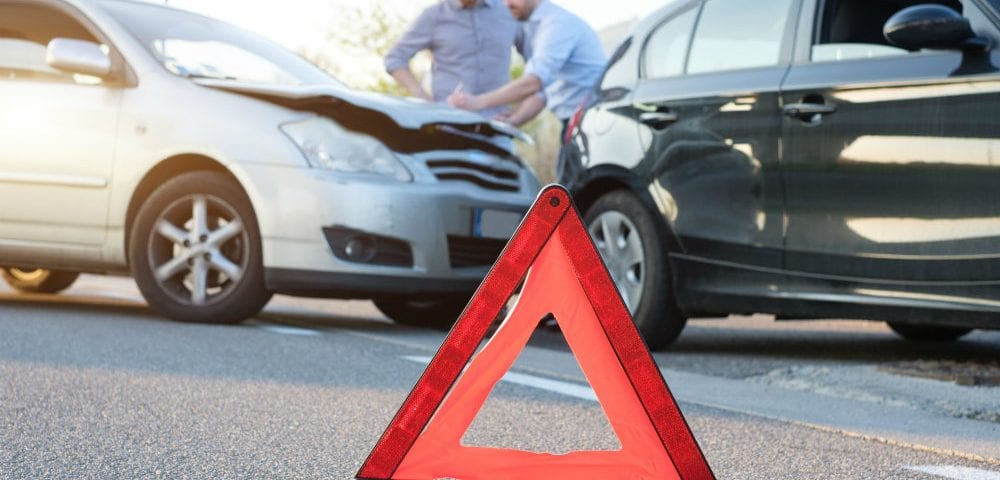Accidents happen… and in the moment, it can be hard to know what to do next. We hope you will never need this information, however, just in case, here is some important information from McCabe & Mack LLP partner Matthew V. Mirabile to help you be prepared to manage the unexpected.
Q. Anyone who’s ever been in a motor vehicle accident knows that it is a terribly frightening experience. In the midst of all that chaos, it can be hard to know what to do next. What steps do you recommend?
A. Accidents can get worse with traffic tie-ups and rubbernecking, so first, determine if anyone is hurt. Call 911 right away to get the police and EMTs on the scene. Hopefully others who have witnessed the accident have already done so. Leave the cars where they are, and keep yourself and others safe by getting of the road if possible.
New York State’s Good Samaritan law protects you from a civil lawsuit, so if anyone is in severe danger, bleeding uncontrollably or in need of CPR and you are able to help, follow proper first-aid and safety protocols. Avoid moving people who are trapped or immobilized unless they are in grave and imminent danger – this should should be left to the first responders, as you would not want to exacerbate a neck or spine injury. Use common sense.
Here are some other key DOs and DON’Ts to remember while on the scene of the accident and in the days and weeks afterwards:
DO:
- DO trade insurance information with the other party. If possible take a photo of their insurance card.
- DO try to gather names and phone numbers from witnesses. This may be helpful to you later should there be litigation. The police don’t always have time to interview everyone.
- DO take photos of the accident, the damage and the intersection where the accident occurred, if you can. If you are not able to do so, ask someone else on the scene to do so for you.
- DO obtain an accident report from the police. Depending on where you are, this may be available right away from the police. In other locations, you may need to go to the police station at a later time to obtain it, or it may need to be obtained from the Department of Motor Vehicles.
- DO go to the hospital and get checked out. Often the adrenaline of the moment can mask symtoms of injury, so it is in your best interest to get checked out right away so you have medical documentation of any injuries and treatment. If new medical symptoms turn up later, be sure to see your doctor right away.
- DO call your auto insurance company as soon as possible after the accident, and definitely within the first 24 hours. They will open a claim and provide you with a claim number to use for any medical treatment. You only have 30 days to provide a no-fault application to your insurance carrier.
- DO seek out a reputable lawyer who specializes in auto accidents and personal injury, especially if you’ve been seriously injured. Your case would be best served by a lawyer knows the insurance companies and how they negotiate, rather than a general practice lawyer or family friend who normally handles real estate closings, traffic tickets, divorces, etc.. Insurance companies often try to reach out and offer a settlement directly to the injured party right away. Instead of accepting this preliminary offer, contact a lawyer from a firm you respect and trust to represent you. In personal injury cases, lawyers typically receive one-third of the settlement as compensation. You should look for a lawyer who is an expert in personal injury, someone who is actively and aggressively litigating personal injury cases and negotiating settlements as their primary focus. You want someone who knows the recent changes in law, the insurance carriers, and the judges and doctors most likely to be involved in your case in your jurisdiction.
- DO protect your rights and your options. Speak to a lawyer first and let them negotiate with the insurance company on your behalf. You have three years from the date of the accident to file a lawsuit. You need a lawyer to deterimine if you meet the “threshold” for a serious injury.
- DO file your no-fault claim paperwork in writing within 30 days after the accident. This is VERY important! If you miss the deadline, you will not be covered by New York State’s no-fault coverage. With no-fault, your auto insurance policy covers your own benefits. It’s always a good idea to review your policy each year to ensure you have adequate coverage — for a little more money in your premium payment, you can have higher levels of protection for yourself.
- DO wear your seatbelt every time you get in the car! Accident prevention is the best strategy. Wearing a seatbelt can save your life. You can get a ticket for not wearing your seatbelt, and if you’re in an accident and you weren’t wearing your seatbelt, it can be used against you.
DON’T:
- DON’T leave the scene of the accident – you can be criminally charged! Of course, if you are taken to the hospital in an ambulance, that is not considered leaving the scene.
- DON’T apologize or accept responsibility for the accident, even if you think it was your fault. If the police write you a ticket, never plead guilty – that is an admission of guilt. Conversely, don’t blame or rage at the other party or the first responders on the scene. Just try to stay cool and keep your emotions in check. This will keep you from inadvertently damaging your potential case or incriminating yourself.
- DON’T go against medical advice. Follow the treatment plan recommended by your doctor or seek another opinion.
- DON’T post or talk about your accident on social media or email, and be sure to lock down the privacy settings on your social media accounts. Remember that everything can be shared electronically, and the other side will be looking for reasons to invalidate your claim. So don’t post or email friends and family with details about your accident, your medical treatment, sporting events, vacation activities or how much you think you’ll get in a settlement, as this could come back to haunt you later. Keep quiet.
- AND MOST IMPORTANTLY – DON’T DRIVE if you are under the influence of alcohol or another mind-altering substance or medication. If you’ve been in an accident and believe you may be at risk for a DWI/DUI charge, you should cooperate with the police. However, you have a right not to talk and not to incriminate yourself. The police and hospital will document your situation. Your first phone call should be to an experienced criminal lawyer. McCabe & Mack LLP can help you with this.
If you’ve been injured in an accident, we — the team at McCabe & Mack LLP — stand ready to help you. Reach out to us at any time at 845-486-6800 or sending a non-confidential message through our website.
Q. What made you decide to practice law, and later, to join McCabe & Mack LLP?
A. Before I came to McCabe & Mack LLP, I worked for Newburgh law firm handling criminal and family law and gained valuable experience litigating in the courtroom. When I joined McCabe & Mack LLP, I continued with criminal and family law, and then began defending people and insurers who were being sued for accidents and premises liability. Over the years, I began to receive more calls to defend people who were injured in accidents. My experience on both sides of the table has definitely been an advantage in helping injured people deal with the aftermath of their accident — from no-fault filings to aggressively advocating for fair compensation for injuries.
McCabe & Mack LLP is a full service law firm that has been in business for more than 125 years, and our experienced team has expertise across a broad range of law, meaning that we can handle nearly every legal concern you may have as an individual or a business. We also are active in the community and give back by supporting and volunteering with local organizations and nonprofits.
If you have any questions, please feel free to reach out to me personally at 845-486-6850 or by email.
Matthew V. Mirabile, a partner with McCabe & Mack LLP, is a graduate of Pace University School of Law. He has more than two decades of experience representing clients who have sustained serious injuries due to auto, premise liability or other types of accidents, as well as businesses and individuals who are being sued for personal injury or property damage. Matt also represents clients charged with traffic infractions, misdemeanors or felonies in all local and county courts, and conducts all phases of criminal defense, including trial.
A native of Cornwall-on-Hudson, Matt continues to make his family home there with his wife Tamara, who is employed by Marshall & Sterling Insurance in New Windsor. They have two grown children. Matt enjoys golf and fishing, and is a longtime Yankees and Jets fan.


